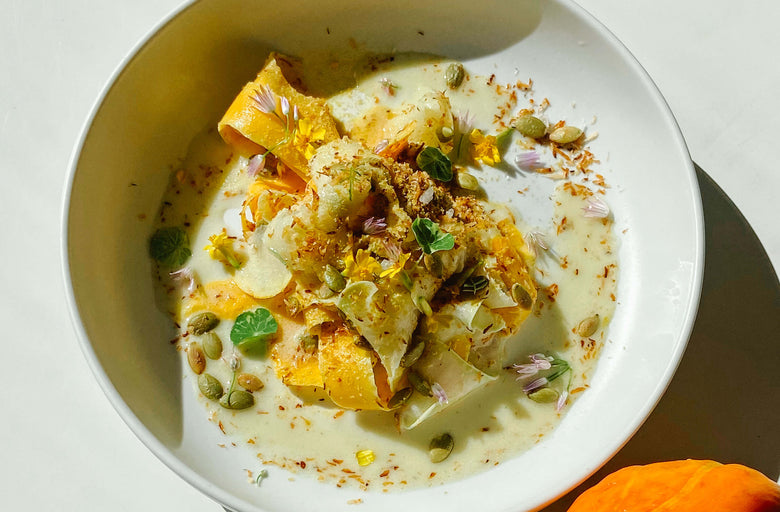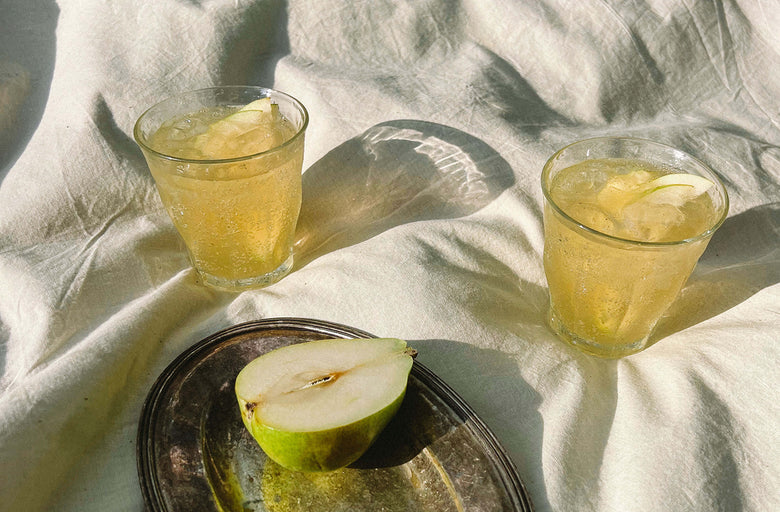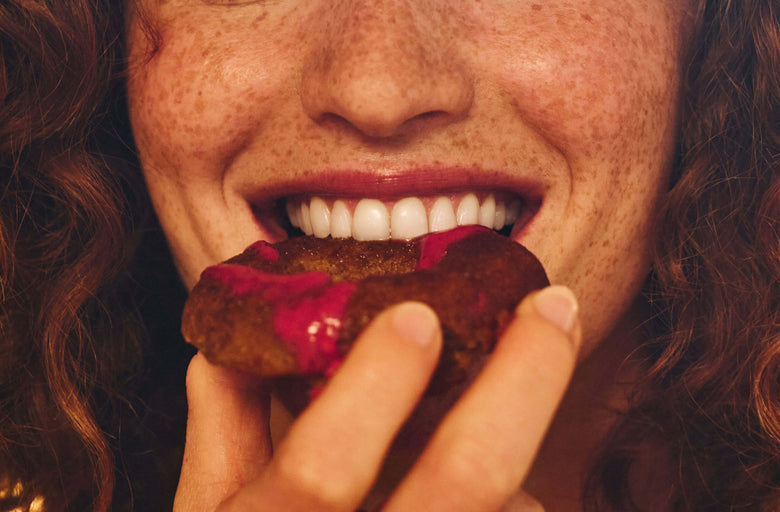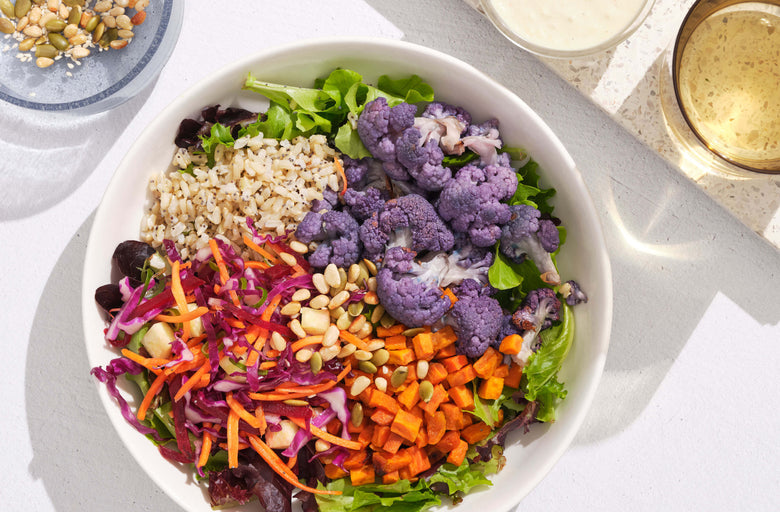We believe that health starts in our gut, and that our gut microbiome—the ecosystem of microorganisms that lives within it—is the foundation of overall vitality. As a dynamic, living organ, our gut microbiome responds to how we nourish it, and varies with our age, habits, and environment.
The health and diversity of our microbiome dictates everything from our immunity to mental clarity, skin health, digestion, and mood. It also controls how we cope with antibiotics, which can be a powerful tool to fight infections, but can also seriously disrupt our gut and total-body health in the short and long term.
“A five- to seven-day course of broad spectrum antibiotics, the kind that you might use to treat a sinus infection or a urinary tract infection, for example, can remove up to a third of your gut bacteria,” says Dr. Robynne Chutkan, integrative gastroenterologist and author of The Anti-Viral Gut: Tackling Pathogens from the Inside Out.
“We don't have a magic wand to erase the effects of antibiotics,” continues Dr. Chutkan. “So be very, very, very certain that the antibiotic is absolutely necessary [before taking it].”
We sat down with Dr. Chutkan to learn exactly how antibiotics affect our gut health, what we can do to mitigate any harm, and ways in which we can promote a serendipitous system.
The Adverse Impact of Antibiotics
“Antibiotics, particularly early on when the microbiome is still forming, can be really disruptive,” says Dr. Chutkan. “We know that long-term antibiotics, particularly early on in childhood and young adulthood, is a risk factor for autoimmune diseases, like Crohn's disease.”
Dr. Chutkan isn’t saying that if your childhood necessitated frequent rounds of antibiotics then you’re fated for an autoimmune disease. Instead, it’s important to look at the bigger picture: if you have frequent antibiotic use on top of a genetic predisposition or other triggers (like urban environments or a diet consisting of highly processed foods), then the potential for developing an autoimmune disease rises.
“As adults, our microbiome is more stable—but there's still significant damage that can be done,” says Dr. Chutkan. “There was a study earlier this year that showed that for middle-aged women taking more than two months of antibiotics over a four to seven year period resulted in a decrease in global cognition equivalent to aging your brain three to four years.”
While repercussions aren’t always as intense with short-term antibiotic use, issues can still arise. Short-term antibiotic use can lead to post-antibiotic dysbiosis, in which we lose beneficial gut microbes, have less microbial diversity, and experience reduced resistance against invading pathogens. These microbial losses and imbalances can ripple throughout our whole body, impacting everything from our skin health to our immune response (70-80% of our immune system actually resides in our gut).
We don't have a magic wand to erase the effects of antibiotics.
Discuss With Your Doctor
There are a lot of gray zones for prescribing, says Dr. Chutkan, so it’s important to initiate a discussion with your doctor to determine if an antibiotic is absolutely necessary.
“The doctor may say, ‘You really need this antibiotic.’ But, if you press them and say, ‘Well, what would happen if I didn't take it?’ They may just say, ‘Well, you'll be sick two days longer, but then this will resolve on its own,’" explains Dr. Chutkan. “It's important to distinguish between ‘This is a flesh-eating bacteria and you're gonna lose a limb,’ versus ‘You're going to have a sinus infection for two days longer.’”
When an antibiotic is indeed the path forward, inquire about a narrow spectrum antibiotic rather than a broad spectrum antibiotic, which is going to kill fewer species in your gut (including fewer of the beneficial ones). Then, lean on the advice below to maximize microbial regrowth during and after your treatment.
Minimizing Antibiotics’ Impact on the Gut
While most microbiomes will start to recover within one to two months post-antibiotic use, there are preventative steps we can take to minimize the microbial losses and promote a happy, flourishing gut (and body).
We know that antibiotics are particularly disruptive to our gut health if they’re combined with a highly processed diet, a diet that’s low in fiber, or a lot of stress. So, focus on foods that truly nourish you, and try to cut down on the foods that encourage the growth of species that we’re not trying to cultivate (i.e., sugar-laced foods that promote yeast overgrowth).
Dr. Chutkan’s dietary recommendations? High-fiber foods, particularly what we call “microbiota-accessible carbohydrates”—oats, brown rice, quinoa, and legumes. Foods that are inulin-rich, which is a kind of fiber, are also great to reach for. Think: garlic, leeks, onions. While you’re in the produce aisle, also consider grabbing some fermented foods, like sauerkraut and kimchi, and maitake and shiitake mushrooms, which contain gut-friendly probiotics. (When Dr. Chutkan is feeling under the weather, she likes to make a healing elixir by steeping dried mushrooms in boiling water.)
Taking high-quality probiotics (like our Complete Probiotic Formula) during and after a course of antibiotics can also help restore your gut microbiota, as well as reduce the risk of antibiotic-associated diarrhea. Dr. Chutkan recommends taking your probiotic as far away from the antibiotic as possible. So, if you're taking an antibiotic at 8:00 a.m. and 8:00 p.m., you should take the probiotic at 2:00 p.m. and then continue taking it for at least 30 days after you’ve finished your course.
Opting to take an antibiotic is entirely personal and should be considered on a case-by-case basis; there may be times when the benefits of antibiotics may outweigh the risks. It’s when we’re equipped with the knowledge of what those risks are that we can analyze our options fully, nourish and prepare our bodies, and sit in the driver’s seat of our own health.






